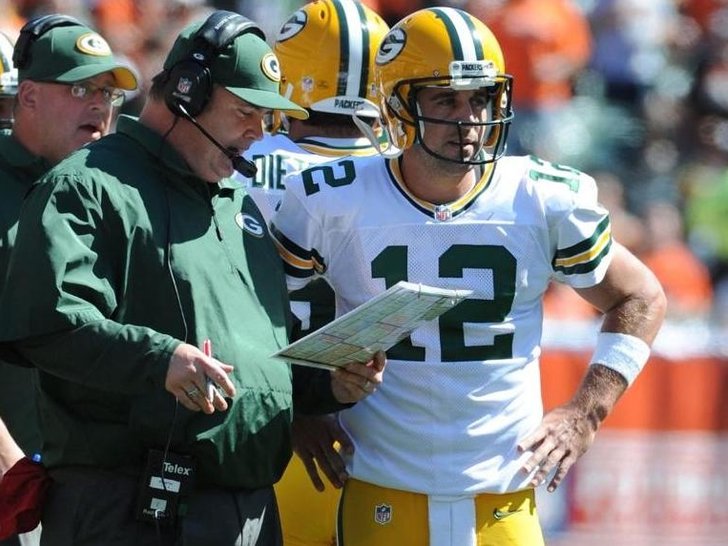This was supposed to be easy.
Well, easier.
You didn’t have the defending NFC Champions or the defending NFC East champions on the other side of the field. Colin Kaepernick and Robert Griffin III did not have to be accounted for.
Sure, it was a road game against a playoff team in the NFL, but the Cincinnati Bengals had already lost to the Chicago Bears and looked unimpressive last Monday night against a hapless Pittsburgh Steelers team.
There seemed to be some advantages on the Packers’ side of the ledger – the most obvious being the ability of the defense to finally let loose with a pass rush against a traditional offense run by a traditional quarterback.
In the first two weeks, Packers defenders were asked to manage running threats like Kaepernick and Griffin III, limiting their ability to just charge up the field in search of sacks and turnovers.
Matthews agreed that the Bengals offense and Andy Dalton didn’t present the same problems as those two quarterbacks, but Dalton still has a Pro Bowl and two playoff berths on his resume.
"I feel like we’re all taking shots at their quarterback now," Matthews cautioned. "You have to understand he’s still a good athlete. I think their scheme doesn’t require him to make the plays that other quarterbacks do with their legs."
But …
"It allows us to be pass rushers a little bit more."
Early Sunday, that showed.
After a fumbled kickoff contributed to an early 14-0 hole, Aaron Rodgers and the Packers offense rattled off 30 consecutive points thanks the Matthews-led defense sandwiching four consecutive turnovers inside two three-and-outs and limiting the Bengals offense to just 37 total yards of offense in that span.
M.D. Jennings also scored a defensive touchdown off a Bengals fumble.
"That’s what we pride ourselves on – is getting after the quarterback and getting turnovers," Matthews said during the week.
The 80-yard scoring drive Dalton directed to open the game seemed like a distant memory at halftime, with the Packers leading 30-14.
Not everything was what it seemed, however.
Rodgers did not throw a touchdown in the first half, completing just 7 of his 14 pass attempts. James Starks was mildly effective running the ball, averaging just under four yards per carry. Despite the extra possessions, the offense managed just three Mason Crosby field goals in the first 30 minutes of play.
Things seemed to turn after the break, though. The Packers opened the second half with an 80-yard drive of their own, capped by a 2-yard Johnathan Franklin touchdown to make it 23-14. The defense forced another punt, which set up Rodgers’ first TD – a 7-yard toss to James Jones to push the lead to 30-14.
A little over five minutes remained in the quarter. Things seemed under control.
Now, it was time do what the Packers did not do the first two weeks of the season – finish strong.
"When you look at the San Francisco game, we obviously had the lead and gave that up; (against Washington) going in there with the shutout and giving up 21 points in three possessions – it is about finishing," Matthews said. "We’re not always going to have a comfortable lead like that. Or, we might be in a tight game like our Week 1 game, so it really is about finishing for both sides of the ball. Especially the defense, coming up a little short last week. We still go the win (in Week 2), but we need to win within our defensive group as well."
With Matthews sidelined with a hamstring injury in the second half, the defense lost its leader and most explosive playmaker. Suddenly the Bengals could move the ball. The pressure on Dalton diminished.
On offense, Rodgers was still struggling, despite the advantage on the scoreboard.
The Bengals scored on two of their next three possessions (and missed a field goal on the other), and the Packers turned the ball over on all three of theirs, including the game-clinching fumble by Franklin that was returned for a score by the Bengals.
The bye week, once considered too early, is needed. Injuries have mounted (again) and the team is clearly searching for a way to close games out on both sides of the ball. The offense has to continue to put points on the board, even if they are "just" field goals. The defense has to continue to make stops, even if it’s a punt and not a turnover.
Easier said than done, of course
Jim Owczarski is an award-winning sports journalist and comes to Milwaukee by way of the Chicago Sun-Times Media Network.
A three-year Wisconsin resident who has considered Milwaukee a second home for the better part of seven years, he brings to the market experience covering nearly all major and college sports.
To this point in his career, he has been awarded six national Associated Press Sports Editors awards for investigative reporting, feature writing, breaking news and projects. He is also a four-time nominee for the prestigious Peter J. Lisagor Awards for Exemplary Journalism, presented by the Chicago Headline Club, and is a two-time winner for Best Sports Story. He has also won numerous other Illinois Press Association, Illinois Associated Press and Northern Illinois Newspaper Association awards.
Jim's career started in earnest as a North Central College (Naperville, Ill.) senior in 2002 when he received a Richter Fellowship to cover the Chicago White Sox in spring training. He was hired by the Naperville Sun in 2003 and moved on to the Aurora Beacon News in 2007 before joining OnMilwaukee.com.
In that time, he has covered the events, news and personalities that make up the PGA Tour, LPGA Tour, Major League Baseball, the National Football League, the National Hockey League, NCAA football, baseball and men's and women's basketball as well as boxing, mixed martial arts and various U.S. Olympic teams.
Golf aficionados who venture into Illinois have also read Jim in GOLF Chicago Magazine as well as the Chicago District Golfer and Illinois Golfer magazines.







